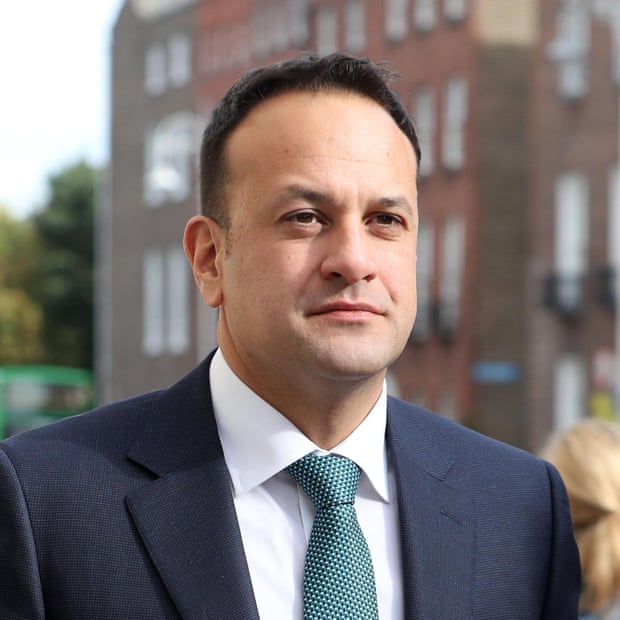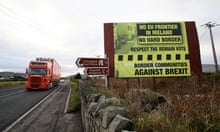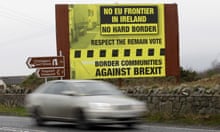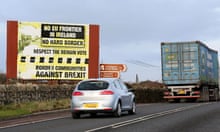The Irish border deal hammered out after objections from the Democratic Unionist party has inadvertently edged Britain towards a soft Brexit deal, political leaders in Ireland have said.
Ireland’s prime minister, Leo Varadkar, said he was delighted with the deal because not only had it delivered an invisible border with Northern Ireland but the DUP clause had unexpectedly delivered a new promise of barrier-free trade between the whole of Ireland and the UK in the event of no deal.
Varadkar pledged that May would have “no closer friend” in the next stage of negotiations on the back of the agreement on the Irish border.
He said it was in Ireland’s interest to help Britain get a deep and ambitious deal because Ireland wanted to preserve the £50bn-a-year trade it does with the UK, its biggest export partner.
He admitted Anglo-Irish relations had been damaged by the fractious negotiations over Brexit, but said that could quickly be repaired.
“I’ll be very frank. Brexit, by its nature, has strained relations between Ireland and the UK. Of course it has. How could it not?” he said. “Our role now is to get through that. I actually think because of this agreement that we have today, because we have the guarantees and the assurances that we sought, Britain will have no closer friend than Ireland.”
He confirmed that under the deal there would be no cameras, customs checks or patrols on the border, something he said everyone north and south of the border should appreciate as a major achievement in the Brexit negotiations.
The 15-paragraph Irish deal also guarantees the Good Friday agreement will continue in all its parts, allows border communities to continue to access EU funding, and means anyone in Northern Ireland opting for Irish citizenship will continue to have rights as EU citizens.
The leader of Ireland’s opposition, who is in a confidence-and-supply agreement with Varadkar’s Fine Gael government, went further. “From the British perspective, it seems to me we are edging towards a soft Brexit, something the Brexiteers may not want to hear, but there are certain realities dawning,” said Micheál Martin, leader of the Fianna Fáil party.
Quick GuideIreland's political parties
Show

Fine Gael
Forged in the Irish civil war as the side that accepted the Anglo-Irish Treaty of 1921, Fine Gael has a centre-right, pro-market and pro-European outlook. The party has two distinctive wings: a socially liberal, urban and professional base, and a rural grassroots following with strong links to the farming community.
Fianna Fáil
Initially comprising opponents of the Anglo-Irish treaty, Fianna Fáil is also seen as centre right. It dominated Irish politics for much of the 20th century and used to enjoy a predominantly working-class membership. An archetypal pragmatic political force, the party now has strong links to builders and property investors.
Sinn Féin
Once umbilically linked to the Provisional IRA, Sinn Féin has benefited enormously from the Irish peace process, with Gerry Adams and Martin McGuinness becoming internationally renowned political figures. The party takes a populist and pragmatic approach to economic issues.
The view in Dublin is that the DUP deal has inadvertently landed Britain on soft Brexit territory and closed off the cliff-edge scenario with WTO tariffs and barriers.
Sources point to the addition of paragraph 50, which pledges “no new regulatory barriers develop between Northern Ireland and the rest of the United Kingdom” in the event of no deal.
It has been added since Monday at the request of the British, not the Irish, to address the fears of the DUP leader, Arlene Foster, that Ireland was trying to separate Northern Ireland from the rest of the UK and force the region into a united Ireland.
It is understood that not one word, full stop or comma was changed in paragraph 49, which the DUP had objected to on Monday.
One informed Westminster source said Ireland had played a clever game and both May and Varadkar had played the DUP to their advantage.
“The Irish government never wanted any east-west sea border, which would have been disastrous for its own economy, but has cleverly used the issue and the DUP to completely outmanoeuvre the UK government to get full alignment with the single market and customs union on the island of Ireland.”
Foster welcomed the deal, saying it met her demand that there would be “no red line down the Irish Sea”.
The Dublin view is that paragraph 50, combined with paragraph 49, delivers a better deal than the one it agreed to on Monday because it will force the UK to align its trading and standards rules with both Northern Ireland and Ireland, a member of the EU.
Informed sources say the Dublin view is that the two paragraphs combined limit the possibility of the UK operating under WTO rules and instead apply a regime very close to the existing rules.
They confirmed that Friday’s deal was a political commitment and not a guarantee, and could be reversed. However, once it is signed off by EU leaders next week, it will become the official framework for the guidelines for phase two talks.
One source said EU27 support for Ireland’s position had been “rock solid” and the British had underestimated that unity.
Ireland’s deputy prime minister, Simon Coveney, said the deal was a relief for everyone in the country”, while Fianna Fáil’s Martin said Northern Ireland now had an opportunity to lift itself from decades of economic poverty.
“There is a sense now that Northern Ireland might get the best of both worlds … Northern Ireland hasn’t done that well historically. It could do with a break,” he said.
Sammy Wilson, a DUP MP, claimed the Irish government’s desire for Northern Ireland to remain in the single market was “gone”.
Sinn Féin’s leader in Northern Ireland, Michelle O’Neill, said she and her party would be talking later on Friday to Varadkar as well as Theresa May. O’Neill said Sinn Féin wanted to see “the protection of Ireland’s interests” in Brexit negotiations.
The rival nationalist party in Northern Ireland, the SDLP, said the deal signalled there was a “soft Brexit” on the way.









